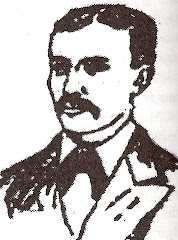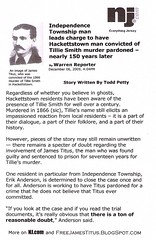The chief justice arrived first, then Prosecutor Smith, and finally J.G. Shipman, whose back yard abutted on the courthouse. The jury was summoned and filed in solemnly, indicating what the verdict was likely to be.
Titus was brought in last, looking very upset and evidently suspecting the worst.
The clerk of the court spoke: "Prisoner look on the jury; jury look on the prisoner. Gentleman, have you agred on a verdict?'
The jurors anwered in unison: "We have."
"Who shall say for you?"
"Our foreman."
The clerk now turned to Formeman James Lake, and asked: "Do you find the prisoner guilty or not guilty as charged in the indictments?"
Perhaps it was the awesome realziation that his next few words were going to bring about another person's death that made Lake nearly gag as he tried to get them out. He struggled to control his voice: "Guilty of mur..."
But the strain proved more than he could handle, and he paused, choking on the word with a sob, then finally blurting it out: "...murder in the first degree." He then collapsed into his seat.
Titus received the verdict wihout emotion, and Shipman demanded that the jury be polled. Some of the members seemed so overcome by the emotion of the moment that they could not utter the word "guilty," and simply nodded their heads.
The trial was over. Chief Justice Beasley discharged the jurors after thanking them for their service, and the prisoner was returned to the county jail to await sentencing.
Sullivan, Denis. In Defence of Her Honor: The Tillie Smith Murder Case. Flemington, NJ: D.H. Moreau Books, 2000. ISBN 0-9662789-3-3









